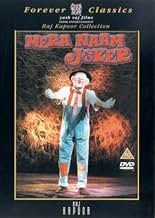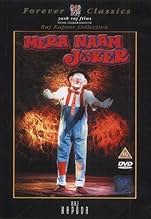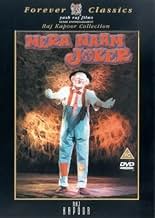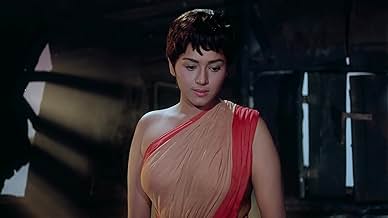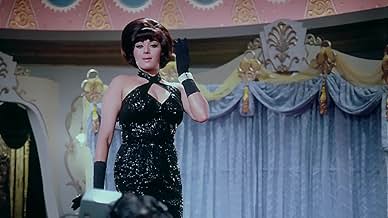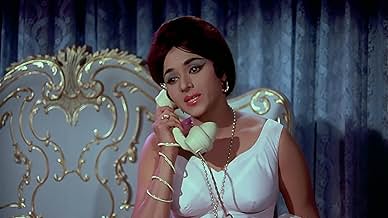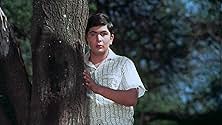Mera Naam Joker
- 1970
- 3h 44min
NOTE IMDb
7,9/10
5,7 k
MA NOTE
Raju fait face à de nombreux obstacles et déceptions dans sa vie.Raju fait face à de nombreux obstacles et déceptions dans sa vie.Raju fait face à de nombreux obstacles et déceptions dans sa vie.
- Réalisation
- Scénario
- Casting principal
- Récompenses
- 11 victoires au total
Achala Sachdev
- Raju's Mother
- (as Achla Sachdev)
Dharmendra
- Mahender Kumar
- (as Dharmender)
Dara Singh Randhawa
- Sher Singh
- (as Dara Singh)
Eduard Sjereda
- Member of the Soviet State Circus
- (as Edward Sereda)
Kseniya Ryabinkina
- Marina
- (as Miss Ksiena Rabiankina of the Bolshoi Ballet, Moscow)
Rajendra Kumar Tuli
- Mahender Kumar
- (as Rajender Kumar)
Rajendranath Malhotra
- Circus Surgeon
- (as Rajendra Nath)
Avis à la une
This supposedly autobiographical epic tale from Raj Kapoor broke all film-making conventions of '70s India. It was too long, there was no constant heroine and the hero never won.
Yet, the story unfolds beautifully, taking the viewer through the life of a simple man and his women. The protagonist is unreal in his simplicity and is more of a metaphor for the ideal lover. And like an ideal lover, he fails again and again. No film has better romanticised the self-defeatist trend of being a "good human being".
It is an understanding of romance in many stages seen through an unbiased almost transparent male perspective. It is more a study of "love" than a love story in itself.
The protagonist, pitched as a clown, brings to light the forever defeated lover, who the world laughs at. Good guys really do finish last. This is no Devdas. This is a man who goes through extreme emotional anguish only to stand back up again and expose himself and his pain to the world so that others may have a good laugh.
The downward spiral of the protagonist's resilient self-defeatist selfless romance bring no conclusive climax. And perhaps, that's how it really is. For people like these, there really is no conclusion. Life just goes on and on and chapters of their defeat just pile on one after the other.
A sublime movie.
Yet, the story unfolds beautifully, taking the viewer through the life of a simple man and his women. The protagonist is unreal in his simplicity and is more of a metaphor for the ideal lover. And like an ideal lover, he fails again and again. No film has better romanticised the self-defeatist trend of being a "good human being".
It is an understanding of romance in many stages seen through an unbiased almost transparent male perspective. It is more a study of "love" than a love story in itself.
The protagonist, pitched as a clown, brings to light the forever defeated lover, who the world laughs at. Good guys really do finish last. This is no Devdas. This is a man who goes through extreme emotional anguish only to stand back up again and expose himself and his pain to the world so that others may have a good laugh.
The downward spiral of the protagonist's resilient self-defeatist selfless romance bring no conclusive climax. And perhaps, that's how it really is. For people like these, there really is no conclusion. Life just goes on and on and chapters of their defeat just pile on one after the other.
A sublime movie.
I can't imagine another director who was as in control of his craft as Raj Kapoor was. Mera Naam Joker is an example of superb cinema. You can like or dislike it but people who appreciate cinematic quality will not deny the heart, soul, technique, and the artistic intensity with which it was made. Now, this film is not easy viewing, it is very entertaining, but it requires patience and it is perhaps one of the saddest films one can say. It's not just about particular scenes, it is the melancholy that Kapoor infuses it with. The film is the story of Raju, a famous clown who arrives on stage to give the last performance of his career. His invitees include all his past love interests, each representing a story of either heartbreak or unrequited love, or both, and three main flashbacks presented in three chapters proceed.
Mera Naam Joker could be described as slice-of-life cinema, given how real and detailed an account it is of one man's life, but if taken literally this would be an understatement, because it's a whole lifetime that is recounted in this picture. I'm not sure why Kapoor chose to make this film so sad in story and execution, and I often wonder if it was the outcome rather than his intention. Mera Naam Joker, of course, like many other films by Kapor, has moments of comedy, many such moments actually, but even beneath all of them, there's a deeply poignant foundation. Ironically, among the toughest and most heartbreaking scenes take place within the circus and even during a seemingly funny performance on stage. Some of these scenes are so poignant they really are tough to go through.
The film's first chapter is one of the most beautiful, sensitive portrayals of teenage life, puberty, and first love ever portrayed on screen. The character of Raju, that clumsy but lovable young adult, who has a heart of gold and a vulnerable soul, is a perfect reflection of the older clown. The way his teenage days are depicted, including his falling in love with his teacher Mary, his sexual fantasies, innocence, feelings of guilt, and romantic realisation, are just extraordinary. Rishi Kapoor is absolutely outstanding in this film, in one of the most natural, amazingly raw and unaffected performances one can imagine by a young man his age. His love interest Simi Garewal is wonderful as his caring teacher, and it's easy to see how this teenager fell in love with her given both her physical appearance and the cordial warmth she exudes.
The second chapter, set within a circus where a group of Russian entertainers arrive, is fascinating. First, being a bilingual episode, it is very rare, but the cultural and linguistic contact between the Indian and the Russian group is stupendous. This is where our protagonist meets the beautiful trapezist Marina, and their relationship is so beautifully portrayed and ends on such a touching, heart-wrenching note. Kseniya Ryabinkina is beautiful and radiant and plays really well opposite Kapoor. The third chapter, while clearly not as good as the first two, is also very interesting, but concludes on the most annoying note in relation to the characters' moral stand and Raju's attitude of accepting injustice and moving on. Padmini, the talented actress who was an extraordinary dancer, is fantastic in her part as the young woman pretending to be a man.
It would be fair to say Kapoor was the one filmmaker of Hindi cinema who had this incredible ability to exploit the raw sexuality of his heroines, sometimes by doing so little and without ever making them look vulgar or cheap. Few scenes could compare to the moment Simi Garewal steps out of the river she fell into and the right tip of her dress reveals her leg, the proceeding scene where she is seen undressing in the bushes, or her nude shot in young Raju's fantasies, which is shot brilliantly. The same can be said about the aesthetic brilliance with which Kseniya Ryabinkina is shot, and the moment Padmini reveals her identity as a woman and wears her sari is a scene of extraordinary artistic merit. The women in this film by Kapoor are the epitome of feminine beauty, each in her own way, and much of how well their beauty was captured is to Kapoor's credit.
Under his own extraordinary direction, Raj Kapoor, the actor, shines through. He employs most of his regular gestures and mannerisms, his well-known flamboyance and innocence, but just like with his circus persona, what lies beneath the surface of this amusingly eccentric man is a truly authentic, heartbreaking and compassionate performance of a man who spent his life wanting to make others laugh and never quite got his due. Other than Rishi Kapoor and the extraordinary leading ladies, Rajendra Kumar is there, Dharmendra and Dara Singh make nice appearances, although the best are Achala Sachdev as Raju's mother who fears most that her son would be a clown like his father, and particularly Manoj Kumar, the teacher's cool fiancé who immediately recognises Raju's feelings for his wife and accepts it with full understanding.
The film's narrative style and high production values are never less than excellent. The cinematography is excellent, and the background score keeps tugging at the heartstrings as it enhances the situations and gives life to an otherwise difficult story. The music by Shakar-Jaikishen is a classic of Indian cinema. "Ae Bhai Zara Dekh Ke Chalo", "Kehta Hai Joker Sara Zamana", "Ang Lag Jaa Balma", are all melodious, beautiful numbers brilliantly and soulfully sung by Manna Dey, Mukesh, and Asha Bhosle, respectively. The film's trademark number, of course, is Mukesh's poignant rendition of "Jeena Yahan Marna Yahan". This song pretty much sums up what Mera Naam Joker is, the sad story of a funny clown, a difficult film to watch but an ultimately rewarding experience. This film is a true example of the craftsmanship of Raj Kapoor, a true showman of Indian cinema who reinforced time and again the high quality present in mainstream films.
Mera Naam Joker could be described as slice-of-life cinema, given how real and detailed an account it is of one man's life, but if taken literally this would be an understatement, because it's a whole lifetime that is recounted in this picture. I'm not sure why Kapoor chose to make this film so sad in story and execution, and I often wonder if it was the outcome rather than his intention. Mera Naam Joker, of course, like many other films by Kapor, has moments of comedy, many such moments actually, but even beneath all of them, there's a deeply poignant foundation. Ironically, among the toughest and most heartbreaking scenes take place within the circus and even during a seemingly funny performance on stage. Some of these scenes are so poignant they really are tough to go through.
The film's first chapter is one of the most beautiful, sensitive portrayals of teenage life, puberty, and first love ever portrayed on screen. The character of Raju, that clumsy but lovable young adult, who has a heart of gold and a vulnerable soul, is a perfect reflection of the older clown. The way his teenage days are depicted, including his falling in love with his teacher Mary, his sexual fantasies, innocence, feelings of guilt, and romantic realisation, are just extraordinary. Rishi Kapoor is absolutely outstanding in this film, in one of the most natural, amazingly raw and unaffected performances one can imagine by a young man his age. His love interest Simi Garewal is wonderful as his caring teacher, and it's easy to see how this teenager fell in love with her given both her physical appearance and the cordial warmth she exudes.
The second chapter, set within a circus where a group of Russian entertainers arrive, is fascinating. First, being a bilingual episode, it is very rare, but the cultural and linguistic contact between the Indian and the Russian group is stupendous. This is where our protagonist meets the beautiful trapezist Marina, and their relationship is so beautifully portrayed and ends on such a touching, heart-wrenching note. Kseniya Ryabinkina is beautiful and radiant and plays really well opposite Kapoor. The third chapter, while clearly not as good as the first two, is also very interesting, but concludes on the most annoying note in relation to the characters' moral stand and Raju's attitude of accepting injustice and moving on. Padmini, the talented actress who was an extraordinary dancer, is fantastic in her part as the young woman pretending to be a man.
It would be fair to say Kapoor was the one filmmaker of Hindi cinema who had this incredible ability to exploit the raw sexuality of his heroines, sometimes by doing so little and without ever making them look vulgar or cheap. Few scenes could compare to the moment Simi Garewal steps out of the river she fell into and the right tip of her dress reveals her leg, the proceeding scene where she is seen undressing in the bushes, or her nude shot in young Raju's fantasies, which is shot brilliantly. The same can be said about the aesthetic brilliance with which Kseniya Ryabinkina is shot, and the moment Padmini reveals her identity as a woman and wears her sari is a scene of extraordinary artistic merit. The women in this film by Kapoor are the epitome of feminine beauty, each in her own way, and much of how well their beauty was captured is to Kapoor's credit.
Under his own extraordinary direction, Raj Kapoor, the actor, shines through. He employs most of his regular gestures and mannerisms, his well-known flamboyance and innocence, but just like with his circus persona, what lies beneath the surface of this amusingly eccentric man is a truly authentic, heartbreaking and compassionate performance of a man who spent his life wanting to make others laugh and never quite got his due. Other than Rishi Kapoor and the extraordinary leading ladies, Rajendra Kumar is there, Dharmendra and Dara Singh make nice appearances, although the best are Achala Sachdev as Raju's mother who fears most that her son would be a clown like his father, and particularly Manoj Kumar, the teacher's cool fiancé who immediately recognises Raju's feelings for his wife and accepts it with full understanding.
The film's narrative style and high production values are never less than excellent. The cinematography is excellent, and the background score keeps tugging at the heartstrings as it enhances the situations and gives life to an otherwise difficult story. The music by Shakar-Jaikishen is a classic of Indian cinema. "Ae Bhai Zara Dekh Ke Chalo", "Kehta Hai Joker Sara Zamana", "Ang Lag Jaa Balma", are all melodious, beautiful numbers brilliantly and soulfully sung by Manna Dey, Mukesh, and Asha Bhosle, respectively. The film's trademark number, of course, is Mukesh's poignant rendition of "Jeena Yahan Marna Yahan". This song pretty much sums up what Mera Naam Joker is, the sad story of a funny clown, a difficult film to watch but an ultimately rewarding experience. This film is a true example of the craftsmanship of Raj Kapoor, a true showman of Indian cinema who reinforced time and again the high quality present in mainstream films.
One of the greatest films ever made in India.No film has ever evoked my heart to such an extent and it's philosophy is outstanding.THe musical theme is magnificent and the songs remarkable.The story of a clown making the world laugh while secretly brushing that tear from his eye is like re-writing the life of Charlie Chaplin in the Indian form.The symbol of the joker however is over repeated after the first part which partly created a monotony for viewers.
I can never forger the scene when he smiles with a tear in his eyes after removing his glasses telling Russian actress Marina in the Circus that he is not sad.It is an absolutely heart touching film unsurpassed in the annals of Indian film history.
By Harsh Thakor
I can never forger the scene when he smiles with a tear in his eyes after removing his glasses telling Russian actress Marina in the Circus that he is not sad.It is an absolutely heart touching film unsurpassed in the annals of Indian film history.
By Harsh Thakor
Mera Naam Joker will always leave a lasting impression on me. The story was loosely based on Raj Kapoor's life & is a tale of divided into 3 chapters (as the joker would say the 1st chapter representing childhood, the 2nd youth & the 3rd ultimately old age). The film tells the story of a man searching for love, giving his heart & soul to entertain the world asking only for the world to have a place in its heart for him. His philosophy prevents him from showing the negative human emotions as the joker lives for the audience applause he can only laugh at the hardships in life, never allowed to shed a tear in sadness.
A scene that sums this up is when Raju (Joker) loses his mother to a heart attack (when she discovers her son has taken up the profession which killed her husband in a stunt that went horribly wrong). But as they say in showbiz the show must go on. Therefore Raju has no time to mourn for the mother who had supported him all his life. Carrying the guilt that he may have directly caused his mothers death he returns to the stage to his adoring public. However the heartache he feels overwhelms him & in a fit of total despair & loss he cries out 'Maa (mother) Maa'. As the circus clears Raju is the only person left standing alone with empty seats surrounding him. Kapoor effectively pulls off the act of shear desolation shielded by a veil of self-ridicule to really give you an impression of the inner torment that Raju eventually succumbs to.
If you are prepared to ignore the flaws in the film such as the over melodramatic parts (which there are plenty of) & prepared to watch the full 4 hours you should find Mera Naam Joker thoroughly consuming & invaluable insight into the life & relationships of an actor few have surpassed in the Indian film industry.
A scene that sums this up is when Raju (Joker) loses his mother to a heart attack (when she discovers her son has taken up the profession which killed her husband in a stunt that went horribly wrong). But as they say in showbiz the show must go on. Therefore Raju has no time to mourn for the mother who had supported him all his life. Carrying the guilt that he may have directly caused his mothers death he returns to the stage to his adoring public. However the heartache he feels overwhelms him & in a fit of total despair & loss he cries out 'Maa (mother) Maa'. As the circus clears Raju is the only person left standing alone with empty seats surrounding him. Kapoor effectively pulls off the act of shear desolation shielded by a veil of self-ridicule to really give you an impression of the inner torment that Raju eventually succumbs to.
If you are prepared to ignore the flaws in the film such as the over melodramatic parts (which there are plenty of) & prepared to watch the full 4 hours you should find Mera Naam Joker thoroughly consuming & invaluable insight into the life & relationships of an actor few have surpassed in the Indian film industry.
Raj Kapoor presents an hypothetical autobiography of scathing power that might be his most uncompromising movie and true legacy. Rishi Kapoor plays the young Raj very convincingly and I found the first part to be the most refreshing and touching. The Joker's philosophy is true but does not have may buyers but use this movie as a grand scale memento mori. Check out Raj Kapoor's 'Jagte Raho' for a more devastating social critique. The film is unique for a true Indo-Russian love story and dialogue in Russian. Love and let live.
Le saviez-vous
- AnecdotesRaj Kapoor put in his own money in the film also mortgaged his house, The film took 6 years to complete and was a big loss.
- Citations
Raj 'Raju' Ranbir: In this world, the only things more dangerous and scary than a tiger are poverty and hunger.
- Crédits fousat the end of the cast list.........: ".......with a cast of thousands"
- ConnexionsReferenced in Swarg (1990)
- Bandes originalesJeena Yahaan Marna Yahaan Iske Siva Jaana Kahaan
Lyrics by Shailendra
Music by Shankarsingh Raghuwanshi and Jaikishan Dayabhai Panchal (as Shankar-Jaikishan)
Sung by Mukesh
Meilleurs choix
Connectez-vous pour évaluer et suivre la liste de favoris afin de recevoir des recommandations personnalisées
- How long is Mera Naam Joker?Alimenté par Alexa
Détails
- Durée3 heures 44 minutes
- Couleur
- Rapport de forme
- 1.44 : 1
Contribuer à cette page
Suggérer une modification ou ajouter du contenu manquant


